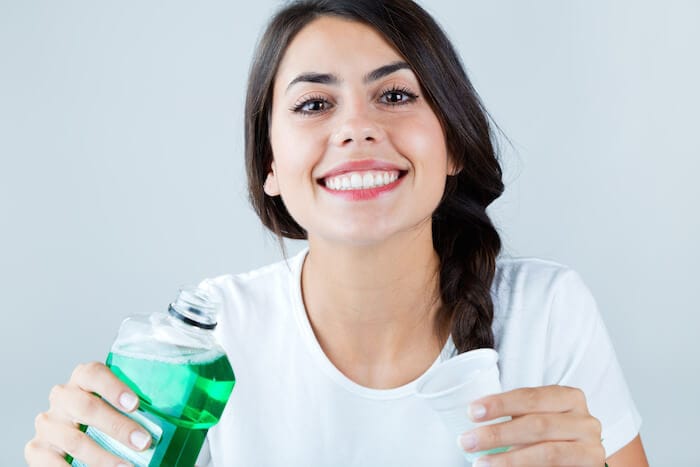These days, everyone knows that mouthwash is a good thing and should be included in pretty much everyone’s daily oral hygiene regimen. Use the very best mouthwash recommended by dentists on a regular basis and it absolutely will make a significant difference to your oral health. That is of course, assuming that you invest in the right mouthwash for you and ensure that you are using it properly.
Is it really possible to use mouthwash incorrectly? Surprisingly, the answer is yes – and research suggests that millions of people are doing exactly that!
As is the case with most things these days, one of the biggest problems is the way in which there is so much contradictory and wholly misguided information out there in the wild. For every fact and recommendation you read, there’s another that tells an entirely different story. Which begs the question – what advice do you listen to?
The answer – only advice that has been provided by an experienced and reputable professional!
So with this in mind, what follows is a brief overview of just a few of the longest standing mouthwash myths which should have been busted a long time ago:
1 – Every Mouthwash Is the Same
Right off the bat comes the still extremely common assumption that every mouthwash is created equally. In reality however, nothing could be further from the truth. Just as some mouthwash products are created for sensitive teeth, others are better suited to gum disease prevention. Likewise, some products contain alcohol and other strong antibacterial ingredients, while others are essentially nothing but water and flavourings. From quality to purpose to properties and so on, pretty much every mouthwash available these days is entirely different than the vast majority of its counterparts. If unsure what represents the very best mouthwash for you, speak to your dentist.
2 – Mouthwash Can Cure Bad Breath
While it’s true to say that mouthwash can temporarily mask unpleasant odours, it generally will do very little to combat the source of the problem. Getting rid of bad breath usually means something of a multi-stage approach – one element being the very best mouthwash for bad breath. Bad breath can be caused by a variety of factors – what you eat, what you drink, your lifestyle choices, your general health, your oral hygiene standards and so on. But whatever the cause happens to be, it is highly unlikely that mouthwash alone will solve your problems.
3 – A Quick Rinse Is Good Enough
If the mouthwash you choose states that it should be held in the mouth for at least 30 seconds, this is advice that is provided for a very good reason. It often takes time for the active ingredients in mouthwash to get to work on the bacteria and plaque you are looking to get rid of. Which means that if you don’t give it long enough to do its job, there’s really no point using it at all.
4 – A Good Mouthwash Can Substitute Brushing
While it’s true to say that using mouthwash is much better than doing nothing at all for your oral health, there isn’t a mouthwash in the world that can do the same job as brushing. And the same also goes for flossing, as while a high quality mouthwash can do a fantastic job eliminating bacteria and giving your mouth a good clean, it doesn’t have the same effect as physically scrubbing your teeth and gums.
5 – Mouthwash Should Always Be Used After Brushing
Contrary to popular belief, it isn’t necessarily advisable to always use mouthwash after brushing. It all comes down to whether or not the mouthwash you use contains fluoride or not. In the instance of a high quality fluoride mouthwash, the very best approach is to use it after brushing and NOT then rinse your mouth with water. The reason being that you want the fluoride to stick around for as long as possible in your mouth. By contrast, if the mouthwash you use does not contain fluoride, it is a better idea to use it before brushing. The reason being that otherwise, you will simply wash the fluoride from your toothpaste out of your mouth, which isn’t a good thing.
6 – Alcohol-Based Mouthwash Is Always Better
More often than not, it’s impossible to replicate that incredible clean feeling that comes only with use of an extremely strong alcohol-based mouthwash. However, this does not necessarily mean that such products are ideally suited to all people and all occasions. For example, those with particularly sensitive teeth or gums or with other oral health problems may be advised by their dentists to stay away from alcohol-based mouthwash at all costs. Likewise, using such products before going to bed can actually lead to the mouth becoming excessively dry overnight, increasing the risk of halitosis.
7 – There’s No Point Paying For Premium Products
As already touched upon a little earlier, to assume that every mouthwash on the market is of the same calibre is to run the risk of putting your own oral health and hygiene on the line. While it’s not to say that paying over the odds will always guarantee you a superior product, paying pennies for the cheapest mouthwash on the market is never advisable. When mouthwash is produced and sold for the lowest possible price, quality of ingredients and its overall performance do not represent priorities for the manufacturer.
8 – Young Children Do Not Need To Use Mouthwash
Last but not least, while it’s true to say that keeping kids away from the strongest alcohol-based mouthwash is a good idea, it’s still important to introduce them to mouthwash from a relatively young age. Your dentist will advise on the very best mouthwash for kids you should be using, along with exactly how, when and how often it should be used. The earlier you begin instilling positive oral hygiene habits, the more likely they are to stick for life!
